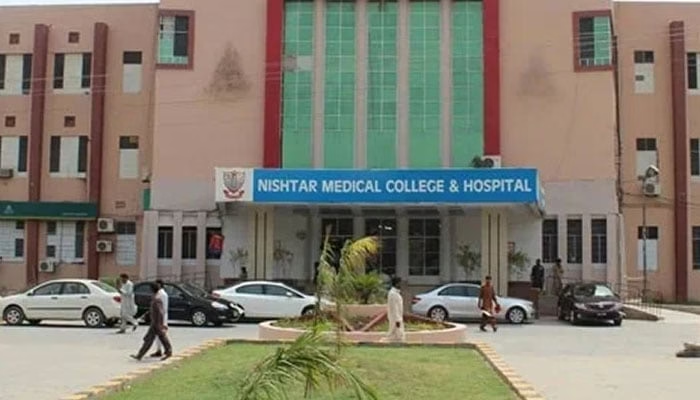Punjab Chief Minister Maryam Nawaz has taken decisive action following the alarming revelation of AIDS transmission to 25 patients at the dialysis unit of Nishtar Hospital, Multan. The incident, which sparked widespread outrage, has led to the suspension of several senior medical professionals, marking a significant step towards accountability in the healthcare sector.
Shocking Discovery at Nishtar Hospital
The issue came to light during a routine investigation at Nishtar Hospital’s nephrology ward, where 25 dialysis patients were found to have contracted AIDS due to negligence. The findings raised serious concerns about the hospital’s hygiene protocols and the standard of care provided to patients undergoing dialysis.
In response, Chief Minister Maryam Nawaz personally visited Nishtar Hospital to address the matter. During her visit, she was given a comprehensive briefing on the incident by hospital officials. The detailed presentation outlined the circumstances leading to the transmission of AIDS and highlighted significant lapses in the hospital’s operational procedures.
Immediate Suspensions and Accountability
Expressing her anger and disappointment over the negligence, Maryam Nawaz took immediate action by suspending five senior doctors and staff members. Among those suspended were:
- Dr. Kazim Khan, Medical Superintendent of Nishtar Hospital
- Dr. Mehnaz Khakwani, Vice Chancellor of Nishtar Medical University
- Dr. Ghulam, Head of the Nephrology Ward
- Dr. Jahangir, Senior Physician
- Dr. Poonam, Consultant Nephrologist
- Dr. Alamgir, Senior Registrar
- Head Nurse Naheed
The suspensions were accompanied by the cancellation of medical licenses for all the implicated doctors. This decisive move underscores the seriousness of the issue and the government’s commitment to ensuring accountability within the healthcare system.
Inquiry Commission Findings
The inquiry commission’s report revealed multiple layers of negligence that contributed to the unfortunate incident. Key findings included:
- Improper Sterilization of Equipment: The dialysis machines and associated equipment were not properly sterilized, leading to the transmission of the virus.
- Lack of Adherence to Protocols: Basic hygiene and operational protocols were reportedly ignored by the medical staff.
- Inadequate Supervision: Senior management failed to monitor the activities of junior staff, allowing critical lapses to occur.
The report also emphasized the need for regular training and audits to ensure compliance with healthcare standards.
Maryam Nawaz’s Response
Maryam Nawaz, while addressing the media during her hospital visit, expressed deep concern over the incident and vowed to take all necessary steps to prevent such occurrences in the future. She stated:
“This is a grave breach of trust and responsibility towards patients who rely on us for their well-being. Negligence at this level is unacceptable, and we will ensure that those responsible are held accountable. No patient should have to suffer due to the carelessness of the very people entrusted with their care.”
Maryam Nawaz also announced plans to reform hospital management systems across Punjab. These reforms aim to establish stricter oversight mechanisms and introduce advanced sterilization protocols to prevent similar incidents.
Implications for Punjab’s Healthcare System
The Nishtar Hospital incident has highlighted serious flaws in Punjab’s healthcare system. It has brought to the forefront the urgent need for systemic reforms, including:
- Enhanced Training for Medical Staff: Ensuring that all healthcare professionals are well-trained in sterilization and hygiene protocols.
- Regular Audits and Inspections: Conducting frequent inspections to ensure compliance with established standards.
- Patient Safety Measures: Introducing technology-driven solutions to track and prevent cross-infections.
Maryam Nawaz has also instructed health department officials to review protocols in all public hospitals across Punjab and submit a detailed report within 30 days.
Public Reaction and Call for Reforms
The incident has drawn widespread criticism from the public and health experts alike. Many have called for immediate action to improve the quality of care in public hospitals. Social media platforms have been flooded with demands for stricter regulations and improved accountability in the healthcare sector.
Families of the affected patients have also demanded justice, calling on the government to take swift action against those responsible. The suspension of senior medical professionals has provided some assurance that the government is serious about addressing the issue.
A Step Towards Accountability
Maryam Nawaz’s swift response to the Nishtar Hospital AIDS scandal sends a strong message about her commitment to improving Punjab’s healthcare system. By holding senior officials accountable and addressing systemic flaws, she aims to restore public confidence in the healthcare sector.
This incident serves as a wake-up call for the entire medical community, highlighting the importance of adhering to strict hygiene protocols and prioritizing patient safety above all else. While the suspensions and license cancellations are a step in the right direction, they must be followed by long-term reforms to prevent such tragedies in the future.
Maryam Nawaz’s leadership in this crisis has been widely appreciated, but the real test will lie in implementing sustainable changes that ensure such incidents are not repeated. As Punjab moves forward, the focus must remain on building a healthcare system that is both efficient and accountable, safeguarding the lives of all its citizens.



